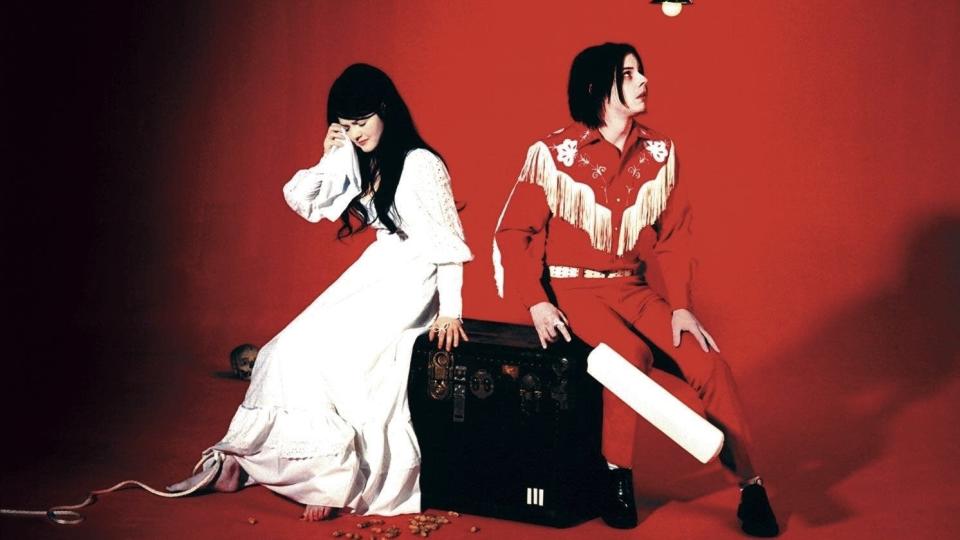Trunk Rock: The White Stripes, Elephant, and the seven note riff that shook the world

On Friday, August 21, 2002 Jack and Meg White concluded their mid-afternoon main stage slot at the Reading Festival with a gloriously noisy, dismantling of Buddy Holly classic Peggy Sue. Jack climbed up onto the drum riser alongside his “sister” and the two of them, nose to nose, attacked their instruments whilst staring intently into each other’s eyes one before tossing their kit to one side and walking off.
Captured tightly for the cameras, it looks like the kind of intimate, spur of the moment happening that you’d see at any tiny, basement garage rock show... except when the camera pans back it reveals a headliner sized crowd of tens of thousands. The White Stripes, ragged, unrefined, minimalist, really shouldn’t have worked in this environment, but the enormous crowd erupted, and the band stole the day from The Strokes, Pulp, Janes Addiction, Weezer and anyone else unfortunate enough to have to share a stage with them that afternoon.
A year later they would be back at the festival, catapulted to almost the top of the bill, with only headliners Blur above them. The rise, and the pace of the rise, from this scrappy, blues rock duo was astonishing, but this time they came with a new collection of songs that had propelled them from an upcoming cult rock act into one of the most recognisable artists in music.
The retro-garage rock big bang of 2001, which saw key releases from The Strokes, The Hives, Ryan Adams and The Von Bondies, was a scene that embraced The White Stripes, even if the band themselves didn’t ever musically fit in with those artists mentioned previously.
Whilst there was a louche swagger, cool, panache and obsession with 1970 New York in the work of their peers, The White Stripes always seemed to reach far further back, incorporating influences from Woody Guthrie-style American folk, Delta Blues, surf rock and rockabilly into their sound. It meant that their own 2001 effort White Blood Cells, a brilliant record in its own right, recorded in just 3 days in Memphis, Tennesse, was swept up in the hype of garage rock, despite being markedly different from just about everything it was associated with.
The normal procedure for The White Stripes during their career prior to this level of mainstream attention would be to record an album, release it, and get ready to record and release the next one immediately. But the success of White Blood Cells, an album that went Platinum on both sides of the Atlantic and saw the group awarded 3 MTV Video Music Awards for their ingenious, Michel Gondry-directed video for the brilliant Fell in Love with a Girl, meant that the band were forced to continue to tour the record throughout 2002. This despite the duo spending two weeks in London’s Toe Rag Studios in April, where they would record 12 of the 13 songs that would make up their definitive album.
Like much so much of their approach, the recording sessions were deliberately modest by design, the album only cost £5000 to make and was recorded on one-inch-thick, old school, reel to reel recording tape using equipment no younger than from 1963.
"If we can't produce something that sounds good under those conditions, then it's not real to begin with,” Jack White, who also self-produced the album, told The Guardian in 2003. “Getting involved with computers is getting involved with excess, especially when you start changing drumbeats to make them perfect or make the vocal melody completely in tune with some programme - it's so far away from honesty. How can you be proud of it if it's not even you doing it?"
So, for a year, The White Stripes were forced to sit on Elephant, and as they did, so their reputation began to grow, thanks to high profile performances at Reading and Leeds, Glastonbury and a slot on The Late Show with David Letterman. By the time their fourth album was ready to be released the anticipation for it was at fever pitch, and though these events all played their part, Elephant’s first single was the essential component to setting the bar sky high.

 Yahoo Autos
Yahoo Autos 